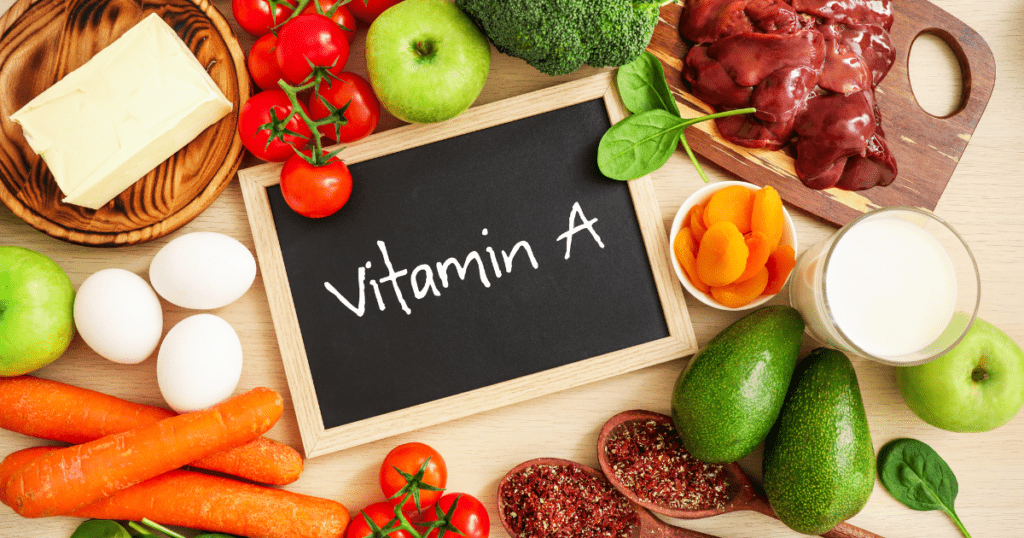Discovering foods high in vitamin A is essential for maintaining overall health and optimizing your body’s function. Vitamin A, a key fat-soluble vitamin, plays a crucial role in supporting vision, immune function, and cell growth. Its importance cannot be overstated, as it also contributes to heart, lung, and kidney health. Ensuring you receive an adequate amount of this vital nutrient can greatly enhance your well-being, making an understanding of its sources and benefits vital.

1. Health Benefits of Vitamin A for Body Organs
Vitamin A is essential for maintaining the health of various body organs. Here are some key benefits:
Eye Health:
Getting enough vitamin A is crucial for the health of your retinas and can help prevent conditions like age-related macular degeneration. It also plays a vital role in the formation of rhodopsin, a photopigment necessary for night vision. Deficiencies in vitamin A can lead to night blindness and are a leading cause of preventable blindness in children globally.
Skin Health:
Vitamin A helps maintain skin health by preventing conditions such as dry, scaly, and itchy skin. Adequate levels of vitamin A contribute to the maintenance of healthy skin and hair, influence the functioning of the skin’s follicular and melanocyte stem cells, and can also help in healing wounds.
Immune Function:
This vitamin enhances immune function by supporting the cellular communication necessary to fight germs and infections. It plays a regulatory role in both cellular immune responses and humoral immune processes, crucial for defending against pathogen invasion.
Bone Health:
Vitamin A’s role in bone health is complex; it supports the functioning of conjunctival membranes and the cornea, and influences the differentiation and function of osteoblasts and osteoclasts. However, both excessive and insufficient consumption of vitamin A can affect bone health, influencing the risk of conditions like osteoporosis and fractures.
2. Sources of Vitamin A
Animal Sources:
Vitamin A can be found in several animal-based foods. Liver, such as beef and lamb liver, is exceptionally rich in vitamin A, providing thousands of micrograms per serving. Other good sources include fish like cod liver oil and king mackerel, as well as dairy products such as butter, cream, and various types of cheese like goat and limburger. Egg yolks also contain significant amounts of this essential nutrient.
Plant Sources:
For those following a plant-based diet, vitamin A is primarily obtained through carotenoids, which the body converts into retinol. Rich sources include brightly colored vegetables and fruits such as carrots, sweet potatoes, spinach, and butternut squash. Red palm oil and biruti palm oil are also notable sources, though care should be taken as processing can reduce vitamin content. Additionally, fruits like mango, papaya, and apricots provide good amounts of provitamin A.
Capsules and Supplements:
3. Vitamin A Deficiencies
Symptoms of Deficiency:
Vitamin A deficiency primarily manifests through vision problems, notably night blindness, where you struggle to see in low light but can see normally in adequate lighting. As the deficiency progresses, you may experience dryness in the whites of your eyes and corneas, leading to the inability to produce tears, foamy spots called Bitot’s spots, and potentially severe conditions like corneal ulcers or keratomalacia, which can result in blindness.
Risk Factors for Deficiency:
This deficiency is rare in developed countries but prevalent in regions where diets lack sufficient vitamin A. It particularly affects infants, children, pregnant women, and breastfeeding mothers. Certain liver disorders and conditions that impair vitamin absorption, such as cystic fibrosis or chronic diarrhea, also elevate the risk of developing vitamin A deficiency.
Global Impact:
Globally, vitamin A deficiency is a significant health issue, especially in Africa and Southeast Asia, impacting millions and leading to severe health complications and increased mortality rates. It is the leading cause of preventable blindness in children worldwide, with an estimated 250,000 to 500,000 children becoming blind each year due to this deficiency. Additionally, it compromises immune systems, heightening susceptibility to infections and affecting growth and development in children.
4. Vitamin A-Rich Foods, Fruits, and Vegetables
Top Vitamin A-Rich Foods:
For those looking to boost their vitamin A intake through animal products, beef and lamb liver are stellar choices, each offering over 7,700 mcg of retinol per 100 grams. Liver sausage stands out as well, with 8,310 mcg per 100 grams. Seafood lovers can turn to cod liver oil and king mackerel, which provide substantial amounts of retinol. Additionally, various cheeses like goat, limburger, and cheddar, along with eggs and whole milk, are excellent sources to incorporate into your diet.
Fruits High in Vitamin A:
Fruits are a delicious way to fulfill your vitamin A needs. Mangoes, for instance, not only tantalize your taste buds but also provide a good dose of vitamin A. Cantaloupes and grapefruits, rich in antioxidants, offer substantial amounts as well. Other notable mentions include watermelons, papayas, and apricots, which are not only refreshing but also beneficial for your vision and skin health.
Vegetables High in Vitamin A:
Vegetables are indispensable in a vitamin A-rich diet. Sweet potatoes top the list with a whopping 1,920 mcg of RAE per cup, making them an excellent choice for anyone’s diet. Butternut squash, spinach, and kale follow closely, offering high amounts of RAE that contribute to maintaining healthy vision and immune function. Other valuable additions include red bell peppers and carrots, both known for their health benefits and versatility in cooking.
Frequently Asked Questions
Q: What is the fruits with the highest vitamin A?
- Papaya
- Mango
- Cantaloupe
- Grapefruit
- Watermelon
- Fresh apricots
- Tangerine
- Nectarine
Q: Which vegetables are particularly rich in vitamin A?
Vegetables high in vitamin A encompass:
- leafy vegetables like broccoli, spinach, and kale
- carrots, sweet potatoes, pumpkin, and summer squash
- Tomatoes
- Red bell peppers
Q: What are the best vegetarian sources of vitamin A?
For vegetarians seeking to increase their vitamin A intake, the following foods are excellent sources:
- Carrots
- Sweet potatoes
- Spinach
- Pumpkin
- Broccoli
- Papaya
- Red bell peppers
Q: Top three foods that are high in vitamin A?
- Beef liver
- Cod liver oil
- Sweet potatoes
- Additional sources include carrots, black-eyed peas, spinach, broccoli, and sweet red peppers.
